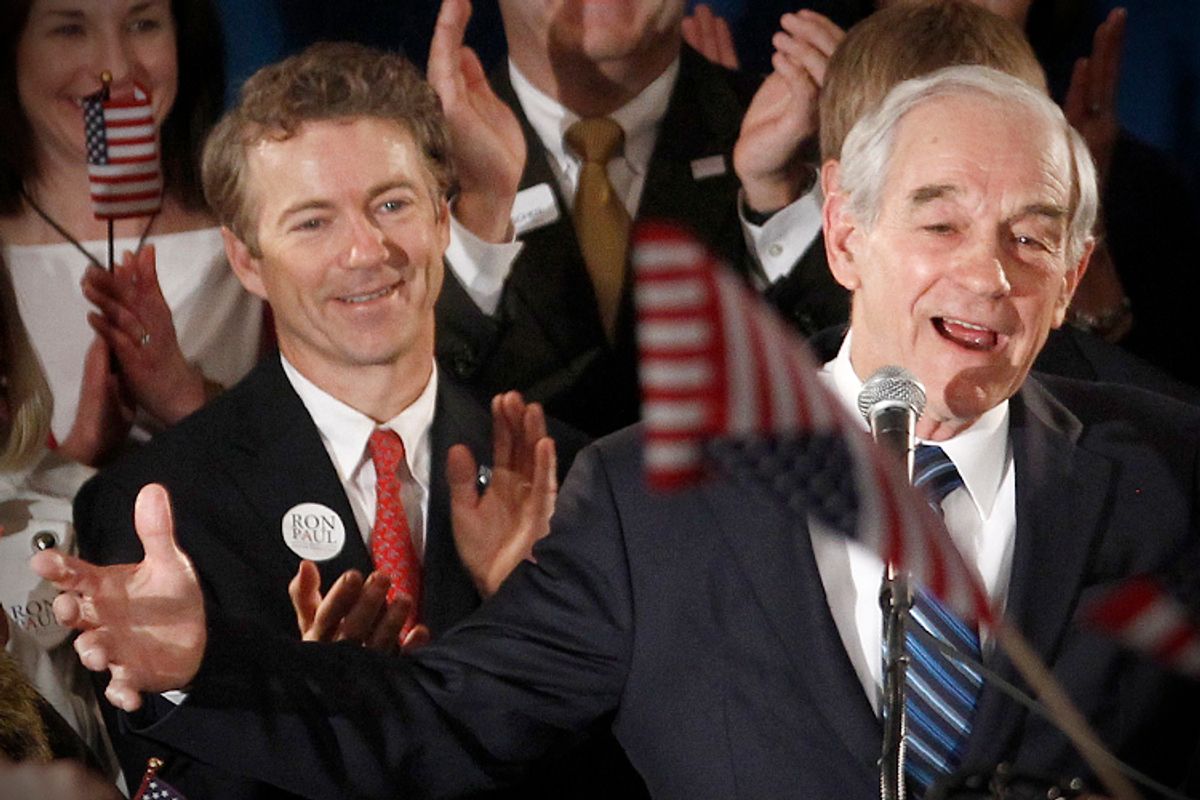A lengthy New York Times Magazine piece this summer asked, "Has the Libertarian Moment finally arrived?" Everyone had a good laugh, because -- as the author of the piece himself noted -- American politics has supposedly been on the cusp of the "Libertarian Moment" ever since some dude came up with the term "libertarian" however many decades ago.
The answer remains no. For it to be the Libertarian Moment, there would have to be evidence that public opinion is in favor of the whole libertarian bundle. It's not. For every area where libertarian positions are growing in public support -- same-sex marriage, pot legalization and drug war/criminal justice reform -- there are those positions that remain tremendously unpopular: eliminating the large social insurance programs and letting the free market do its magic everywhere, opening the borders. Even curbing military action overseas, a position that was pretty popular following the Iraq disaster, is less so after ISIS started chopping off heads on camera. Is this becoming more libertarian? On some issues, yes, on other issues, no. Glad we had that discussion.
It's still no small thing, though, that certain libertarian-favored issues that would have been laughed away in mainstream political discourse even a few years ago no longer are. Prominent politicians are talking about police demilitarization, and the absurd Pentagon program of offloading surplus military gear to local police forces. They are talking about sentencing reform, and eliminating mandatory minimum prison sentences for nonviolent drug offenders. They're saying "we'll see how the experiment in Colorado and Washington goes" when it comes to marijuana legalization, instead of making stupid stoner jokes and then saying no.
There's progress on these issues. But is it enough, at this point, to actually achieve federal legislation on them -- to break free from the old, stodgy impulses?
The recent evidence suggests ... no.
Let's consider police demilitarization, an issue that went mainstream following the Ferguson protests in August, when the public noticed that a relatively small St. Louis suburban town's police department was deploying top military weaponry in the streets, and this was Odd. Congressmen Hank Johnson and Raul Labrador, a Democrat and a Republican, introduced a modest bill to "ban the Pentagon from granting local police free automatic weapons, armored vehicles, weaponized drones, combat helicopters, grenades, silencers, sound cannons and other equipment, although police could still purchase such gear with local budgets or through grants from the Department of Homeland Security." As the Huffington Post reports, that bill has gone nowhere in the House and won't be brought up before the end of this Congress:
But even with a few Republicans among the bill's 45 co-sponsors, House Armed Services Committee Chairman Buck McKeon (R-Calif.) has refused to give the demilitarization bill a committee vote. House Majority Leader Kevin McCarthy (R-Calif.), meanwhile, has prevented the bill from coming to the House floor.
As for marijuana legalization? The District of Columbia voted in favor of a ballot measure this November to legalize possession of small amounts of pot. But since the true local leaders of Washington are federal appropriators, and federal appropriators are stubborn old cranks, the question immediately became: Would Congress try to block this? And sure enough, it's looking like the Republicans who run the House Appropriations Committee will:
House Republicans are fighting to roll back Washington, D.C.'s recently passed marijuana legalization initiative in the midst of high-level negotiations over the national budget, according to several Democratic and Republican sources.
Republicans are insisting on including a provision in an omnibus spending bill that would ban the District of Columbia from using local funds to carry out the legalization measure, which was passed overwhelmingly by ballot initiative in November.
The circumstances aren't all the same with these two measures. On the police decriminalization bill, there have been powerful police lobbies at work preventing it from even getting a committee vote. The pot-legalization blocking is really the handiwork of a couple of blowhards on the appropriations committee who are worried about The Drugs. Rep. Andy Harris is a doctor and as a doctor knows that the pot is bad, and throwing people in jail for smoking a joint is the best way to stop it. Rep. Hal Rogers, old person and appropriations chair, "has been a vehement opponent of relaxing drug laws, animated by the spread of methamphetamine and prescriptions drug use in his home state of Kentucky." Why a scourge of meth and pill-popping in Kentucky inspires him to block a District of Columbia referendum to legalize possession of marijuana, I do not know.
These two legislative episodes show that the biggest obstacle to enacting some of the more exciting libertarian policies to drift into the mainstream recently is the Republican old guard's law-and-order impulses. These impulses worked well for the party when they were pounding against crime from the '70s onward, but recently it's seemed that some of them, like Rand Paul, might be willing to admit that the policies enacted in that era went too far. That sort of thinking still has a long way to percolate before it's reflected in legislation.

Shares